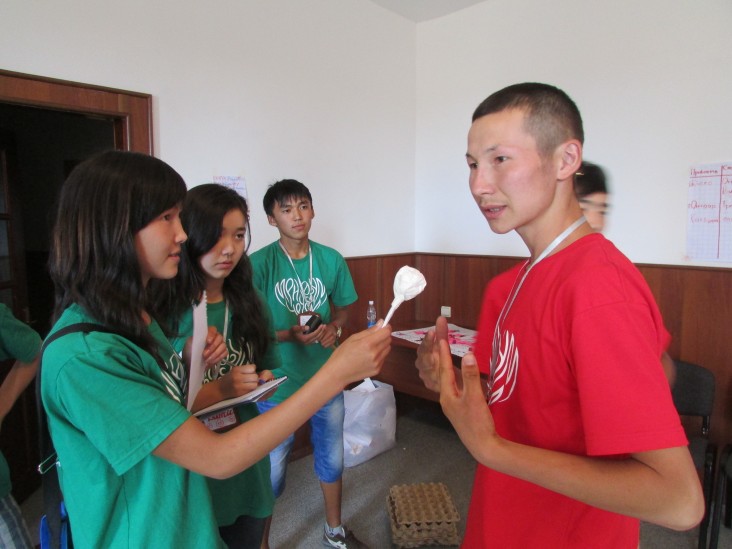
April 2014—In November 2013, a group of 20 student body presidents from the Talas region organized a charity concert that included performances by schoolchildren, youth art groups and local comedy troupes. Ticket sales from the concert raised over $300, all of which was donated to a local nursing home.
In the Kyrgyz Republic, particularly in under-resourced regions like Talas, projects like this are usually only possible with the financial support of international donors. In this case, however, one young man has found other creative ways to finance socially-minded projects through the investment of local communities. Azamat Karabotoev, the 17-year-old president of his student body, saw a pressing issue in his community – in this case, aid to the elderly and infirm – and was able to do something about it.
Azamat’s tools for realizing his vision were made possible through USAID support to Democracy Camps for high school students, implemented by the International Foundation for Electoral Systems (IFES) for more than 10 years in the Kyrgyz Republic. Students participating in these two-week camps are exposed to democratic principles and the tenets of sound civic education, but also are able to develop strategies for improving their lives and their country. All camp alumni are expected to develop projects that will work in their local communities, supported through the extensive camp alumni network and publicized on the website www.city4u.org.
Azamat’s project is one of hundreds of post-camp initiatives developed and implemented by alumni. Azamat considered a wide range of social problems in his native region of Talas, noting in particular that the lack of funding for crowded nursing homes and other social services, was a chronic problem unlikely to get the attention of larger-scale donor-funded initiatives. Azamat credits the Democracy Camp with giving him the tools to make a difference. He confessed: “Prior to my participation in the Democracy Camp, I felt shy when speaking in public. However, after improving my oratory skills, I now feel more confident. I have also learned that in order to organize a fruitful and productive project, I first need a good team.” Azamat’s leadership, ability to mobilize others, and commitment to vulnerable communities have separated this from other alumni projects.
Azamat’s story exemplifies the impact that young people can have in their communities, even with limited resources. IFES evaluations have shown that camp alumni return home with increased confidence and project management skills, as well as a desire to transform their ideas into realizable, tangible projects that benefit their communities.
In contrast to activists who fear that social change can only happen with donor support and in large cities, Azamat himself has demonstrated that determination and ingenuity can make grassroots ideas a reality. This is the essence of the Democracy Camp motto "I Decide Myself" (Men Ozum Chechem): by taking personal responsibility and mobilizing a local community to identify and solve problems, citizens find that real and lasting change is possible.
Links
Follow @USAIDCtrAsia, on Facebook, on Flickr, on YouTube







Comment
Make a general inquiry or suggest an improvement.